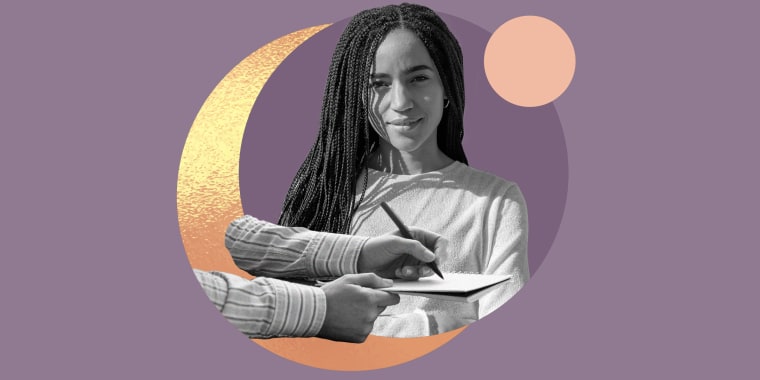In TMRW’s “My First” series, we highlight true stories from readers who open up about the pivotal moments in their lives — from their first jobs to their first breakups and more — and what they learned from these personal milestones.
When I was 18, I broke up with my parents.
I knew this would be coming, so I started working various part-time jobs at 15, even putting in a full-time schedule during summer breaks. Although I’d grown up exposed to and had access to upper-middle-class opportunities, my family was low-income. When it came to higher education, I, like many others around the country, felt crushed by the weight of college tuition.
For more like this, follow TMRW on Instagram at @tmrwxtoday.
During my freshman year at Goucher College, I worked both on-campus and off-campus jobs nearly full time while attending classes full time and living on campus. I maxed out government loans and financial aid, and then paid the difference out-of-pocket with the money I earned. I wanted to get the most out of the financial investment of college.
My first semester was a low point and by my second semester, I was nearly burnt out. The financial and emotional stress of it all was starting to take a toll and made me feel suffocated. I was crying all the time and spread thin across all my responsibilities. I couldn’t sleep, but I was constantly exhausted. One of my close friends saw what I was going through and suggested I check out the college’s student counseling center.
Seeking help
I’d always been interested in health and wellness, but I had resisted going to therapy for so long because I thought I was OK on my own. At the time I didn’t fully believe that talking to a professional, instead of just my friends and community, was worth it. I came around to the idea in part because on-campus counseling was free for students.
My first one-hour therapy session was cold but, in hindsight, gave me a starting point to build a foundation. My therapist asked me questions like “What’s bringing you in today?” and “What would you like to talk about?” I was guarded and wanted to present professionally, to mirror the older adult in the room, so I tried to share my experience without expressing too much emotion.
I felt like he was listening to me, but I didn’t feel fully understood by him. It felt like talking to a wall in some ways and it didn’t provide the warmth I was seeking. If I had a choice, I would’ve preferred talking to a woman but I continued to see him regularly for the remainder of the semester. My therapist at the time reminded me a lot of my own dad, someone who I associated with the stress I was feeling. They’re both Black men who worked as counselors and there were a lot of similarities between them, including their appearances and the way they spoke. I think that was definitely part of the reason I never warmed up to my therapist in the end.
It wasn't a perfect situation, but I didn’t want to have to repeat my story to a new person and I couldn’t afford to put my money toward an off-site counselor. I don’t think I ever got to the point of trusting that particular therapist but, despite those drawbacks, I still benefited greatly from the experience. At the end of each session, there were enough teeny takeaways that added up to something substantial. I was thirsty for a new perspective and it gave me a way to view my life through a different lens.
Therapy became one of the measures I took — along with confiding in close friends and my boyfriend at the time, eating healthy and working out every other day — to rebound. By itself, therapy wasn’t enough, but it became a reminder to take care of myself and prioritize my mental health. I’m glad I didn’t take that on by myself because I think I would’ve cracked if I attempted to sustain that breakneck pace.
Eliminating stigma
When you think of therapy, you may think about the stigma surrounding it. Judgments abound, including ideas that someone who needs therapy is “crazy,” “not being strong” or “can’t handle life.” Communities of color, especially, think church or a religious place of worship should be enough, but it may not be and it’s helpful to have nonreligious spaces where the focus is truly on health.
I care about dismantling the stigma around seeking professional mental health support, especially for people of color and other marginalized communities. We are the people who need support the most based on societal mistreatment and additional cultural stress that comes with existing in a white-dominant country.

Now that I've graduated, become financially comfortable at 28 years old in a way I never would have expected and worked at big companies, like Google, YouTube, Time and Sony Music, I’ve realized I need to share the truth around my experience. I think receiving mental health support has played a huge role in my success.
If you’ve ever considered going to therapy — whether it's preventative, for a specific area in your life or even if you don’t think you need it — I encourage you to try it out. It's rarely harmful and often hugely helpful. In fact, I'd argue there's always value from getting an additional perspective, especially from a professional.
